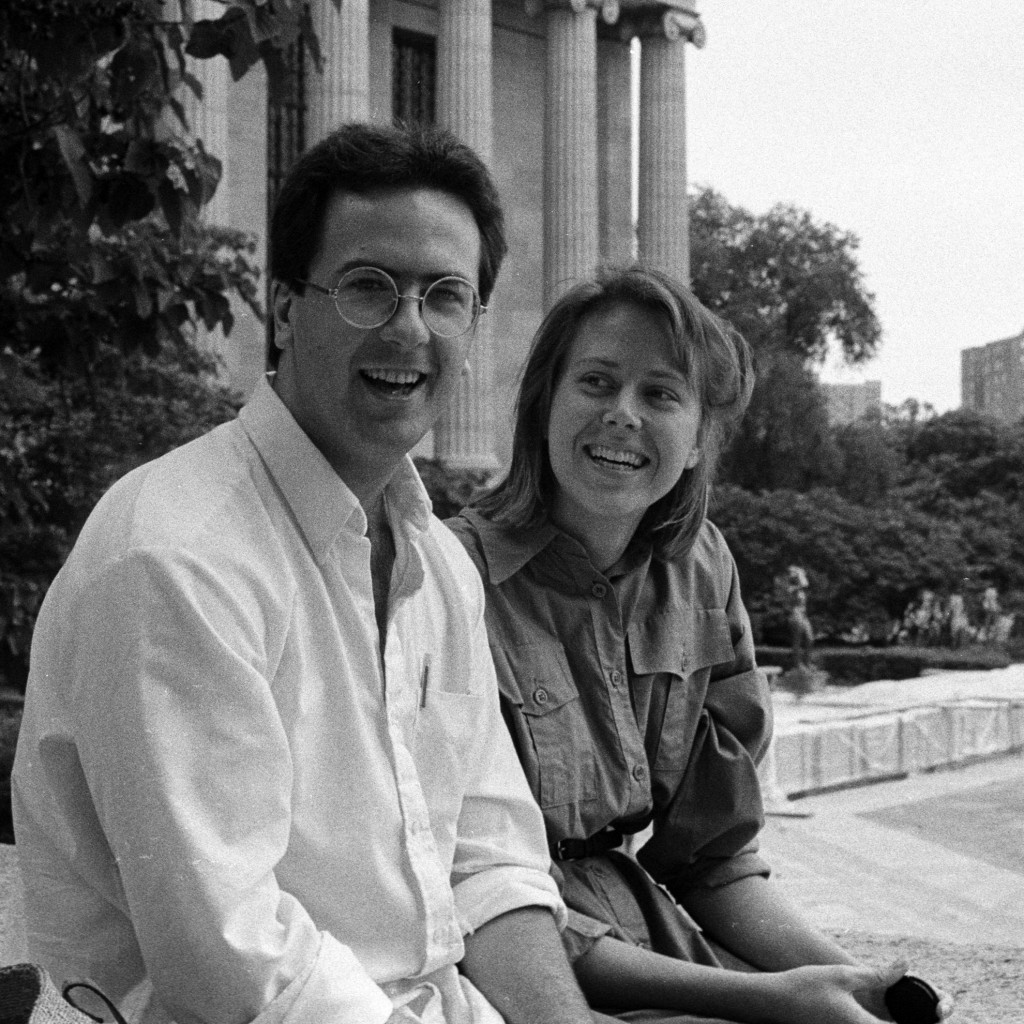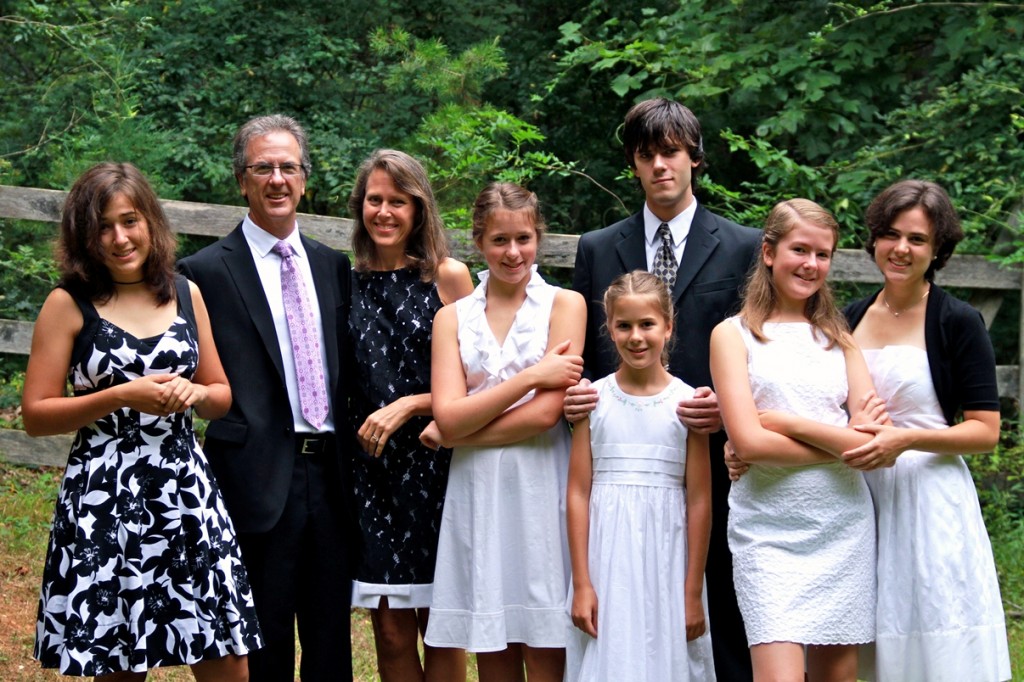We pulled away from a dinner with their family in our childless days and a sense from Him surfaced in my spirit: “you’re going to learn from them.”
And that we have.
In those days, we had no idea that God was preparing us to have a bigger-than-average family or that we’d even find a passion and calling, imparted from Him, within our four walls. Louis and his wife, Claire, have shown us what the Father’s heart looks like in the context of raising up children … lots of them. Family isn’t their afterthought, just as it isn’t His.
They demonstrated this to us before their words explained it and we had a living laboratory for a few sweet years just a short drive from our house.
For a while now, Nate and I have been trying to figure out how to “share” them with those around us; today was long-awaited :). We’re hoping this piece will find its way into a book they one day write. He’s given them a beautiful life message of His heart.
(For the month of May and a week into June, I will be pressing pause on my online writing and this space will become a series of testimonies of what He births in the midst of delay, perplexity and pain. Author friends from around the world, who love words on a page and Him even more, will share, here, how they have seen Him make the bitter, sweet.)
+++++
My wife and I never wanted any children. We have six. Laugh if you will, but ours is less a story of God’s irony than it is about His ability to change hearts. And I assure you; parenting is about changing your heart.
In 1984 we were one of a handful of “young married” couples in a small church in Houston, Texas. A few years later, approaching our early 30s, we were the last of those couples to remain childless. That fact caused a great deal of consternation among much of the congregation—especially the older women. The beleaguering refrain became, “When are you going to start having children?” For sure, these folks were well meaning. They loved children and were excited to see us grow in grace. Claire and I? Not so much. Weary of the constant questioning, I eventually came to say, “I’ll have a child as soon as I see one that’s worth having.” That generally ended any further pestering.
My response, of course, was exceedingly ungracious. It was, however, just as truthful. The children I had met were demanding, fussy, disobedient, self-centered, manipulative, and for the most part, downright unpleasant. Claire and I were happy. We didn’t see how a child or, even worse, children were going to make anything any better.

Claire cringes every time I tell that part of our story. But I love to repeat it, not for any inherent shock value but because it powerfully illustrates the transformative power of God. Ezekiel 36:26 states, “Moreover, I will give you a new heart and put a new spirit within you; and I will remove the heart of stone from your flesh and give you a heart of flesh.” That is what God eventually did with us—He changed out hearts. And it began with a step of faith, a simple act of conforming our thinking to the scripture.
If there is one overriding Biblical truth about children, it is found in Psalm 127:3-4, “Behold, children are a gift of the Lord; the fruit of the womb is a reward. Like arrows in the hand of a warrior, so are the children of one’s youth. How blessed is the man whose quiver is full of them.” This is where the heart of parenting begins.
It was the summer of 1989 when Claire and I made the “mistake” of visiting friends in California. They had three young children—a four-year-old, a two-year-old, and a newborn—certainly a recipe for chaos and disorder of the most unpleasant sort. To our amazement, we were met with the most delightful, obedient, and joyful children we had ever experienced. And for the first time in our lives, Claire and I began to assent to the possibility of the chance of the potential of the hope that children are indeed a gift, a reward, and a blessing. We came back to Texas and gave God the opportunity to prove Himself true to His word. He did—in alarmingly quick fashion.
One thing you should know about our “leap of faith:” the moment Claire went into labor with our first born we both looked at each other and simultaneously proclaimed, “What have we done? We were happy.” Any doubt, however, vanished the instant Nichole was born. In that moment a heart of stone was turned into a heart of flesh. In that moment, in a very literal sense, a father’s heart was born.
I can still get emotional when I think about Nichole’s birth. But all those warm fuzzies don’t necessarily equate to a biblical heart for our children. We all want our kids to be happy, have a nice marriage, make a good living, and not embarrass us too badly. That’s natural. What I’m talking about is supernatural. It is God’s heart for His children that we desperately need. It is God’s heart for our children that can, if we will allow it, transform our parenting.

Nowhere in the scripture is this heart more painfully illustrated than in the book of 2 Samuel. In the 13th chapter you will find the story of Amnon, David’s eldest son, and his rape of his half-sister Tamar. It is a horrible episode of the grossest immorality where Amnon entices Tamar to be brought into his presence by feigning sickness. As she is attending to him, he rapes her and then, ignoring her pleas to dignify the act by marrying her, casts her out. Two years later Absolam (David’s third son and Tamar’s full-brother) avenges his sister by assassinating Amnon. The result is Absolam fleeing to his grandfather, the gentile king of Geshur for safety from Levitical retribution. It is a father’s worst nightmare and a position that is both emotionally and morally untenable.
I assume we all know how the story plays out. David is eventually persuaded by Joab to bring Absalom back from Geshur. But David’s gesture of mercy is not enough for his son. Absalom revolts. He forces his father to flee for his life, takes the throne, and then publicly humiliates David by sleeping with his concubines. It is the culmination of David’s worst fears. He is rejected, despised, humiliated, and hunted by a son to whom he has extended mercy.
In the end, of course, the rebellion is brought down and Absalom is killed. There are many who would be relieved. Many who would be overjoyed. David’s response to hearing the news is found in 18:33: “And the king was deeply moved and went up to the chamber over the gate and wept. And thus he said as he walked, ‘O my son Absalom, my son, my son Absalom! Would I had died instead of you, O Absalom, my son, my son!”
I hope you can understand David’s response because I believe it reflects a true father’s heart. Joab couldn’t. You can find his reaction to David’s grief in the next chapter: “Today you have covered with shame the faces of all your servants, who today have saved your life and the lives of your sons and daughters, the lives of your wives, the lives of your concubines, by loving those who hate you and hating those who love you…” (19:5-6a). On the surface it is not an unreasonable response. It is certainly the “righteous” response, clearly measured by the standards of right and wrong. But Joab’s heart never really seemed to beat with God’s.
I have a friend who thinks much like Joab. He is a moral man who found out his 17-year old son was downloading pornography and spending time partying with drugs and alcohol. That was 4 years ago. His son has yet to be allowed to set foot in their house. His mother and sister are forbidden to visit him. When it was first discovered, the father came to me and told me that he would understand if we no longer wanted to associate with them. I wept in sadness to think that would even enter his mind.
I will not begin to tell you how he should have handled his son any more than I will remotely suggest whether David was right or wrong in his handling of Amnon and Absalom. There are no easy answers for those types of situations, and that type of proposition is far from the point I am trying to get across.
What I do know is that my friend’s heart was full of anger, disgrace, and judgment—to the point where he projected that judgment on me. He could not understand how his son could betray him, his faith, and his morality in such a disgraceful manner. And the sting of that affront was apparent in every conversation I had with him and in his handling of his son. Don’t misunderstand me, his grief for his son was real, but almost all of it was filtered through a lens of a righteous self.
David, on the other hand, weeps for a one who is by any measure a despicable son, not in moral outrage, but with a broken heart. His willingness to have taken Absalom’s place is not predicated on Absalom’s repentance. It is a willingness to have sacrificed his life for the unlovely and the unrighteous.
That is not just a father’s heart. That is the Father’s heart. It is the heart that is willing to leave the ninety-nine to search for the one lost sheep (Luke 15:4). It is the heart that demonstrated great love toward us while we were still sinners (Romans 5:8). And it is the heart that was willing to die in our stead (Romans 5:10).
I do not want to any degree suggest that David was a model father. I use this episode as both instruction and warning. You see, in some ways being willing to die for our children is an easy thing. I am certain each of us would gladly step in front of train or take a bullet for any of our children. But dying day to day is a different matter, whether that means the sacrifice of career, a certain standard of living, a Sunday afternoon football game, or just 5 minutes peace. That is the slow, painful death of a diligent parent.
This is an unfortunate biblical truth: life comes forth from death. With regard to his children, David may have discovered that truth too late. But with regard to our children, we must recognize it as our calling. The good shepherd lays down his life for his sheep.
It is our deaths, died daily, that will produce much fruit in the lives of our children.
Louis DeLaura is an under-employed architect living outside of Charlottesville, Virginia on more land than he is capable of properly caring for. He and his wife, Claire, have 6 children (ages 21 thru 10). He has never blogged, which explains why this post is so long.
